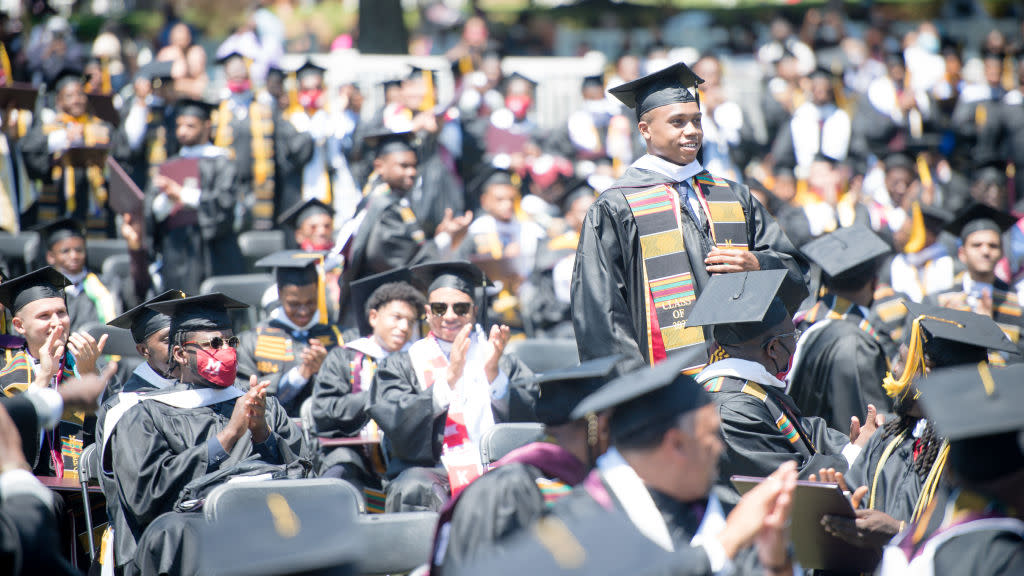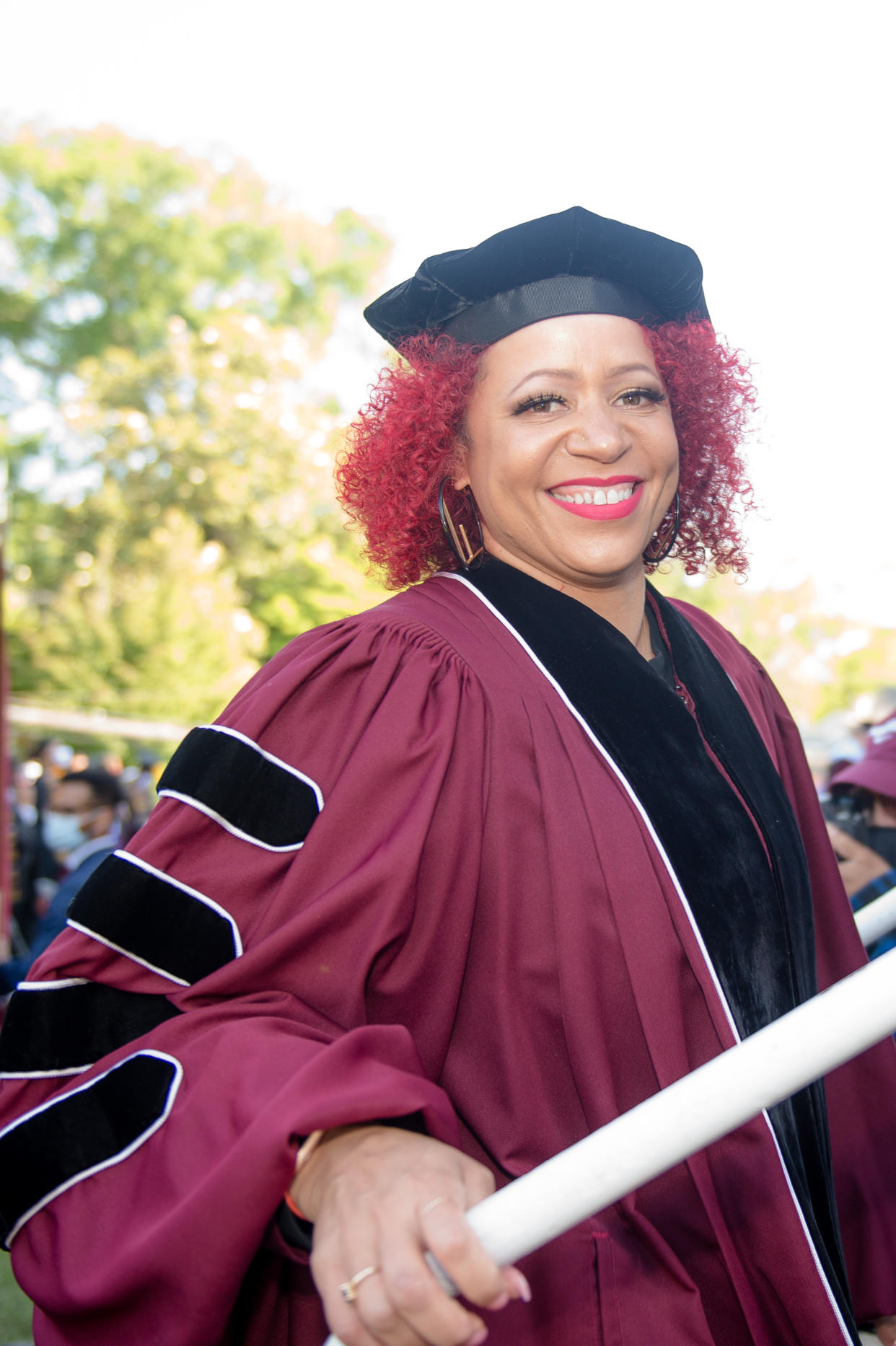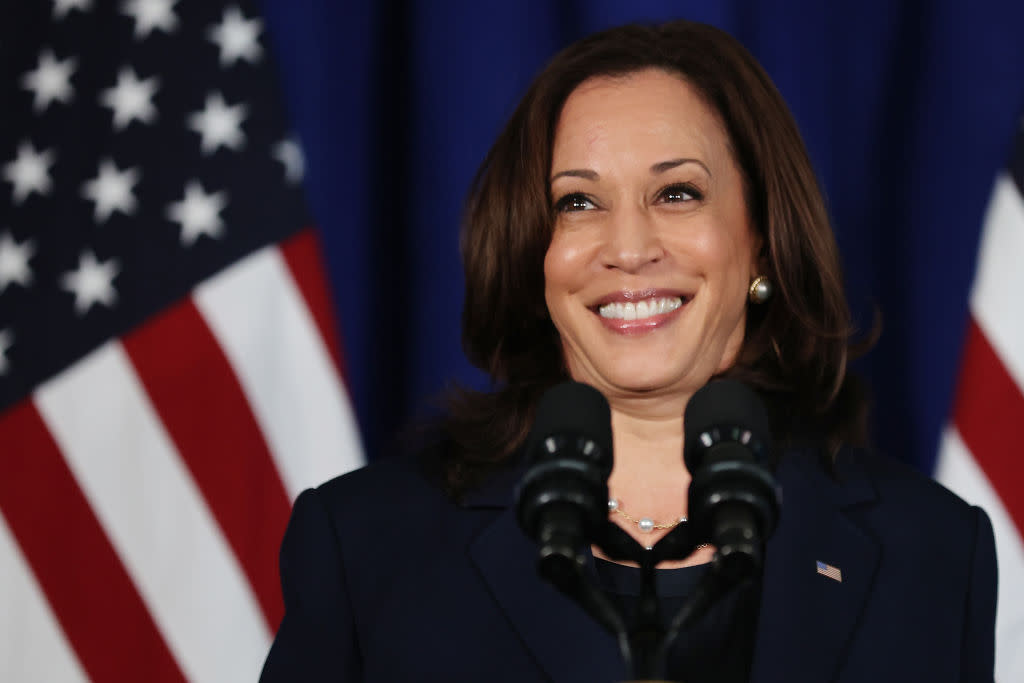With record donations, high-profile hires and famous alumni, HBCUs are on a roll
Historically Black colleges and universities in America are on a roll.
Last week, Howard University made headlines by landing two high-profile hires: celebrated journalists Nikole Hannah-Jones and Ta-Nehisi Coates. The same week, it hosted Vice President Kamala Harris, the highest-ranking elected official to have attended an HBCU, who announced a major voting rights initiative during her visit.
Those moves are just the latest in what has been a heady period for HBCUs, which continue to see a marked uptick in donations that began following the death of George Floyd. In December, MacKenzie Scott, the ex-wife of Amazon founder Jeff Bezos, donated $50 million to Prairie View A&M in Texas, $40 million to Morgan State University in Maryland, $30 million to Winston-Salem State University in North Carolina and $20 million to both Delaware State University and the University of Maryland Eastern Shore.
While the surge of attention being paid to HBCUs is notable, it is something that these historic institutions have long deserved, according to Michael Lomax, president and CEO of the United Negro College Fund.
“For over a century and a half, they've been the primary source for higher education for African Americans and almost single-handedly have built the Black middle class, the Black professional class,” Lomax told Yahoo News in a video interview. “So the Black community has known that these institutions exist.”

On Monday, Education Secretary Miguel Cardona toured Johnson C. Smith University, an HBCU in Charlotte, N.C., and participated in a roundtable with university president Clarence Armbrister and Rep. Alma Adams, D-N.C., the founder of the Bipartisan HBCU Caucus. During his visit, he doubled down on the federal government’s support of institutions that, he said, have been underserved for decades.
“HBCUs historically have had to do more with less, so it’s really important as we build back better that we support our HBCUs across the country, making sure that we provide them the support, because they’re supporting our country,” Cardona said. “I recently learned that 50 percent of the Black dentists across the country come from HBCUs and 80 percent of the Black judges have studied at HBCUs, so their contribution is tremendous. It’s really important that we support them.”
In another sign of the change of fortunes, Delaware State University purchased Wesley College, a predominantly white college in Delaware. It was the first time an HBCU has acquired another institution of higher learning.

“This is a historic moment,” Delaware State University president Tony Allen said in a statement. “In our view, that point is noteworthy, but it is not the reason this is such an attractive opportunity. To serve more students who need our brand of excellence, education, and care, we needed to increase the size of our footprint, build on our key academic programs, grow our research base and enhance our economic impact on the State of Delaware.”
According to WHYY, Delaware State University stands to add 50 acres of land, 21 buildings and 14 academic programs. It will also take on 60 percent of Wesley’s faculty and staff members and 77 percent of its students.
For many Americans, HBCUs have long been seen as second-tier schools born of an era of segregation. Because of that, Hannah-Jones’s decision to decline an offer of tenure at the University of North Carolina at Chapel Hill in favor of a position at Howard resonates more loudly.
In a statement, Hannah-Jones took a swipe at years of American thinking that the learning havens built for Black students, some before the Civil War, were second-class institutions.

“I have decided that instead of fighting to prove I belong at an institution that until 1955 prohibited Black Americans from attending, I am instead going to work in the legacy of a university not built by the enslaved but for those who once were,” she said.
The same day, Howard announced that Coates was also joining its English faculty.
“I hope one of the things that's going to happen by this bright light being shined on Howard with Nikole Hannah-Jones and Ta-Nehisi Coates joining the faculty is that people are actually going to learn how extraordinary those faculties have always been,” Lomax said. “How diverse those faculties have always been, and how rich the classroom and the research and the library experience has been, at Howard, at Hampton, at Morehouse, at Spellman, at Xavier, at Morgan State.”
Last week, during a press conference at the NBA finals, Phoenix Suns point guard Chris Paul was asked whether his attire promoting HBCUs was “coincidental.”
“It’s not coincidental. I’m enrolled in Winston-Salem State. I’m a student,” he responded.
Paul, who is also taking a course at North Carolina A&T, another HBCU, went on to say that he hoped to use his platform to make sure the schools “get that spotlight.”
In her remarks at Howard, Harris credited the school with helping her build her career.
“Howard University is a very important part of why I stand before you at this very moment, as the vice president of the United States of America,” she said.

At a time when the nation has been grappling with its own history and how to teach students about it in the classroom, Lomax thinks it’s no surprise that HBCUs have become a big part of the conversation.
“They have done that work with limited resources, little respect and recognition and support, and in this time of Black Lives Matter, in this era when we are asking questions as a nation about inequality and inequity,” Lomax said, “I think that it would stand to reason that Black colleges would matter as well. And so I think there is greater attention.”
But to sustain the momentum of what much of Black America already knew, Lomax stressed the importance of telling the HBCUs’ story effectively and changing the “second-class” narrative of what he called engines of socioeconomic mobility, referring to the HBCUs’ role of consistently moving their graduates from low-income to middle-income status.
“There are 101 institutions, and all of them have great faculty and great students, but they don't have the resources that they need to have, and they should be getting more,” Lomax said.
____
Read more from Yahoo News:


